Table of Contents
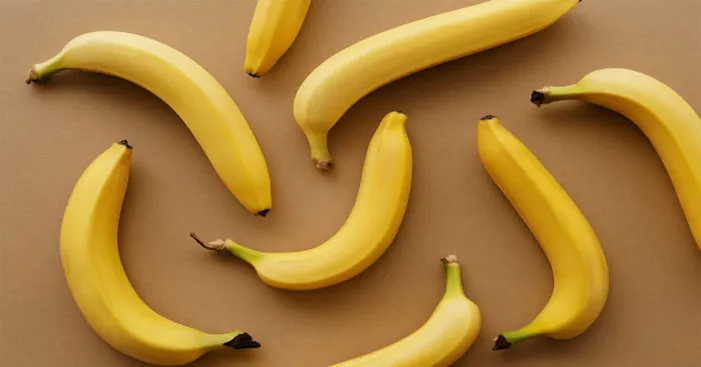
There are so many facts about bananas and it’s impossible to stack them all in just one article.
However, we made a great selection for you of the most interesting facts about bananas that you probably never heard of.
Also, we added few tips on how to consume bananas, how to buy and store them, alongside some precautions you need to know before you consume bananas regularly.
In this article, I am going to mention many amazing facts about bananas and how this fruit help deals with Insomnia, Blood pressure, Hair growth issues, Cramps, Diarrhea, or even Constipation!
Facts about Bananas:
Why bananas are curved?
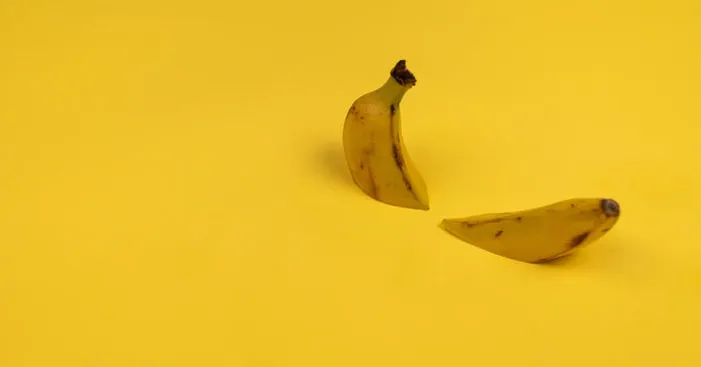
As a start, not all bananas are curved as we know them to be! Some types are straight!
Bananas grow on a 4ft stalk that is hanging towards the ground, the banana rows surround the stalk as they all curve towards it.
That could be the reason why, as they all curve due to suffocation trying to get as much sun as possible.
To confirm that, we’ll have to ask the banana plant!
What to make with overripe bananas?
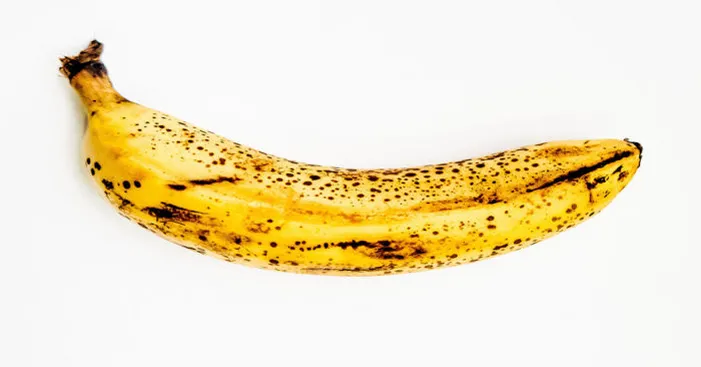
New research conducted by specialists, has confirmed that overripe bananas encourage the production of an anti-cancer protein.
In his report, professor Senji–Japan said: “The more the bananas ripen, the more anti-cancer chemicals they have”. (1)
After ripening, bananas peel starts turning brown, while the inside is still white or light brown.
As the peel is not entirely black-rotten, the fruit itself should still be white and not rotten yet, then it’s totally fine to eat.
In truth, overripe bananas have more antioxidants than newly ripen bananas.
That means next time when you purchase bananas and some of them start turning brown, you can freeze them for future uses!
Overripe bananas develop a natural sweetness and can be a great substitute for added sugar.
Whether you plan on making Smoothies, Pancakes, bread, or muffin… Use the overripe bananas you froze before!
How many bananas should you eat a day?
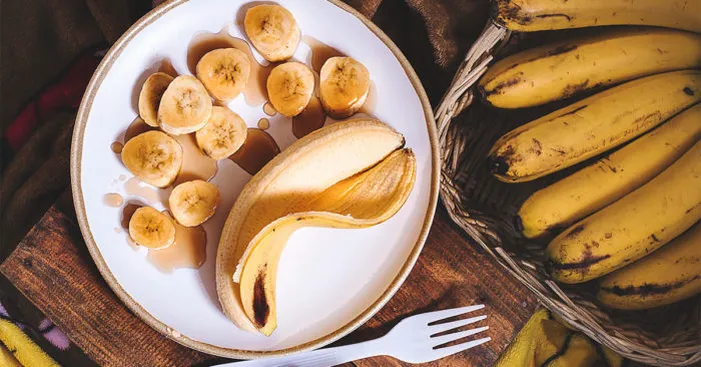
There is no specific number that is considered good or bad health-wise.
In fact, a man called Naader Reda had 30 bananas in one sitting.
Theoretically, you could have as many as you want, as long as you keep track of your calorie intake and do not harm your health.
Therefore, as part of a nutritious balanced diet. 1 to 2 bananas a day is widely considered a healthy intake.
The most famous fact about bananas is that they are rich in potassium and vitamins.
Are Bananas not trees?
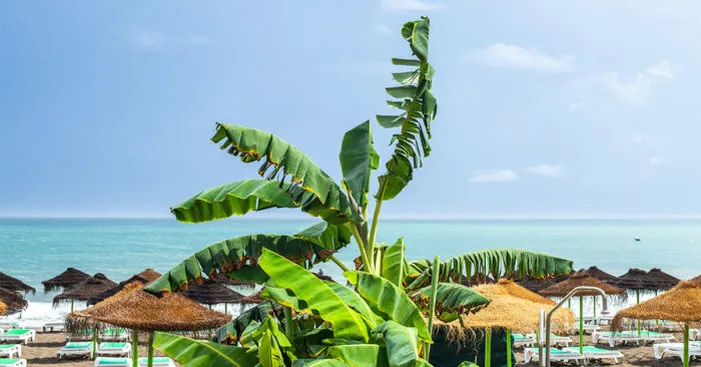
Yes, bananas grow on huge grass that stands like a tropical palm tree.
In fact, they are considered the tallest grass on earth with a length up to 60ft (20m).
The legs of a banana plant extend horizontally and point towards the ground.
Also, these plants don’t grow from seeds but instead by growing small plants next to the main fruity plant.
Once those plants reach 4ft tall, we can transplant them where they will mature, produce fruits, and eventually small pups of their own.
The lifespan of a banana grass plant is about 25 years which is the average lifetime of most trees. (2)
Banana leaves and stalks:
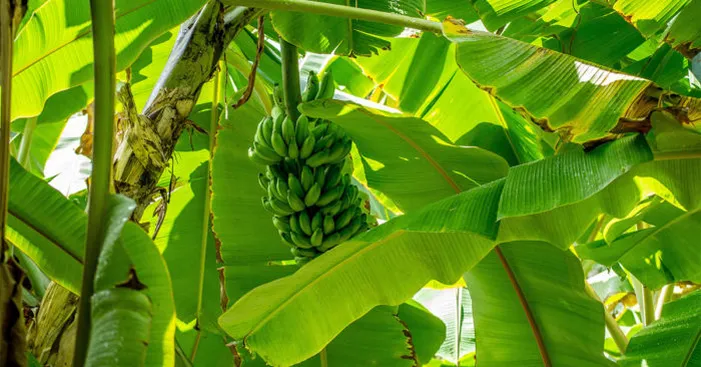
Banana plants usually grow about 10 strands of leaves that reach lengths of 6ft (2m).
Each strand contains leaves that grow outwards like in palm trees.
During the incubation phase, the plant starts producing flowers and clusters that turn into fruit stalks.
These stalks grow facing the ground and reach about 90lbs (40Kg) and contain 200 mature bananas.
Cloned bananas:
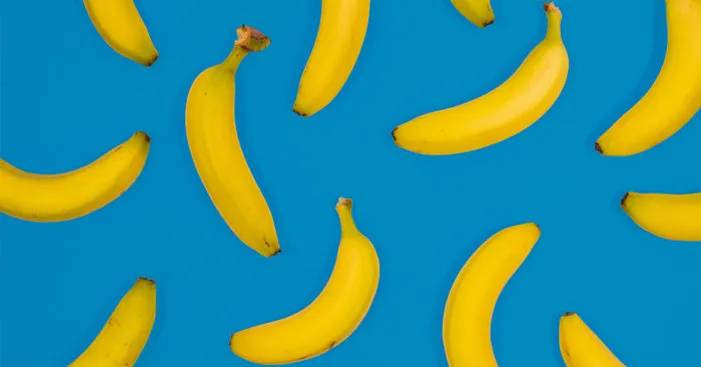
There are several thousand types of bananas but 99% of products in grocery stores are somewhat “cloned”.
This is because most types of bananas were exposed to fungal diseases that eliminated them.
Therefore, through complex scientific procedures, most of those types were cloned and brought to life again from preserved seeds.
However, there are side effects that show in the fruit with black spots emerging on the banana peel.
Also, these plants no longer bore seeds and some of the cloned varieties don’t taste as sweet as the ancient natural ones.
Other banana facts:
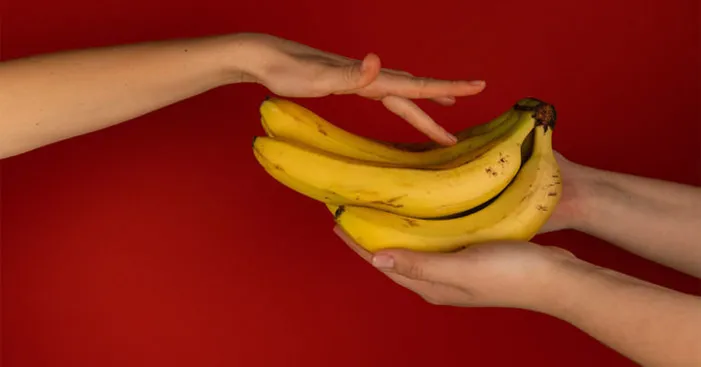
There are many more interesting facts about bananas which is why we gather this list of 40 banana facts for you:
- Bananas contain a type of amino acid called tryptophan.
Once it gets into the body, this amino acid promotes the production of serotonin and melatonin.
Both of these natural hormones regulate sleep and gives the body a feeling of comfort and relaxation. - We all hate being stung by a bee.
However, rubbing the inner side of a banana peel on the stung spot will relieve the pain and calm the inflammation. - Bananas may reduce the bad symptoms linked to smoking as they contain potassium, magnesium, vitamin B6, and 12.
- Bananas used to look different from nowadays products, they were fuller with seeds on the inside.
- A banana plant produces fruits only once in its lifetime then it dies.
- There was an ancient myth between sailors as they believe that bananas bring bad luck.
Some would say that this is probably bananas rot fast so sailors had to sail fast which caused accidents.
Others think that it is because bananas produce large amounts of methane gas which may have suffocated sailors.
- It is almost impossible to extract banana juice and the ones we have are probably a mixture of milk or other juices with banana paste.
- Some thieves used a banana under their jacket and point it like a gun and they got away with the robbery.
- In the Bahamas, people used to soak banana peels in water and then drink it to relieve blood pressure.
This may seem weird, but the peel of this fruit is full of essential nutrients such as potassium and this act is scientifically correct. - In some cultures, people rub banana peels on leather shoes to polish and restart them.
- The smell of bananas causes the body to send signals that give us a feeling of satiety and fullness.
- The average price of a banana is 37 times less than how it used to be in the 1980s.
- Rubbing Banana peels on the teeth for a week makes them healthier and whiter.
- If you eat 480 bananas, you will probably die from a potassium overdose.
- We eat more than 100 billion bananas worldwide every year.
- There is an international banana museum in Palm Springs California which contains over 16 different types and over 20,000 items related to bananas. (3)
- There are more than 300 different banana varieties worldwide that grow in 100 different countries.
- Bananas come in different colors such as green, yellow, red, and even blue.
- Bananas contain K-40 potassium which is radioactive, however, the moderate consumption of bananas causes no risk of radioactivity.
- Garment industries use the fibers of banana plants.
- Bananas are the number one product in terms of sales in Walmart. (4)
- The top consumers of bananas are the people of Uganda, as they consume around 220 Kg of bananas every year. (5)
That is equal to eating 5 bananas a day, crazy right!? - By soaking banana peels in water for 7 days, we can use them as a natural fertilizer for our home plants.
- The edible part of the banana is more than 60% of its weight.
- Some studies show that eating bananas during pregnancy may increase the chance of having a boy. (6)
- The cosmetic industries use bananas in many of their skin and hair products.
- In India, bananas are considered as the fruit of paradise and Hindus even claim that Eve offered Adam a banana instead of an apple.
- In Sri Lanka, people believe that bananas plant leaves were used to dress human beings after they have been expelled from paradise.
Facts about green bananas benefits:
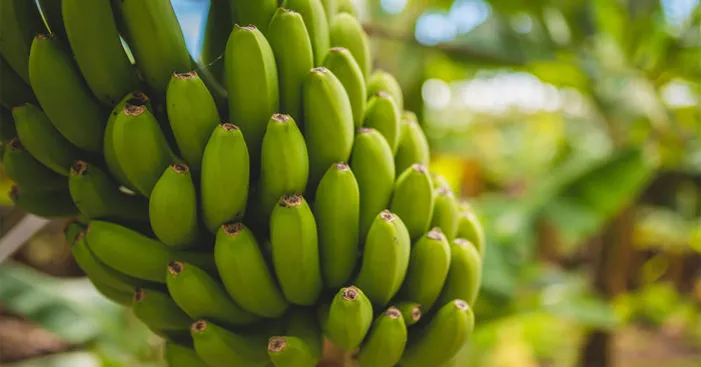
- Help regulate cholesterol:
- They contain dietary fiber which helps in regulating cholesterol.
- Help deal with anxiety and depression:
- They contain tryptophan, a protein that is later converted within the body into serotonin.
Serotonin is known to help put your mind at ease, boost your mood, and make you feel happier. - Help your kidneys function:
- They help in balancing electrolytes within the body.
That helps keep your kidney functioning and reduces kidney failure. - Help controls blood sugar:
- They are rich in vitamin B6.
This vitamin increases hemoglobin production which helps in blood sugar control. - Help your digestion system:
- They contain a lot of fiber and starch which helps make digestion smoother.
- Hangover cure:
- They could be a good choice for mornings if you’ve overdone it a bit the past night.
Bananas blended with berries and coconut milk makes a good hangover recovery drink. - Improve eye vision:
- Green bananas have carotenoids, the plant pigments responsible for coloring fruits and vegetables.
When you eat a green banana, your body converts carotenoid into vitamin A, which is necessary for a good eye health
Facts about bananas benefits (Cavendish):
Bananas nutritional data:
This data counts for the recommended daily intake of 1 average banana (118g):
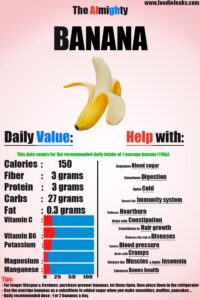
- Calories: 150
- Fibers: 3g
- Protein: 3g
- Carbs: 27g
- Fats: 0.3
- C Vitamin : 12%
- B6 Vitamin :20%
- Potassium :18%
- Magnesium: 10%
- Manganese: 16%
Fruits are generally rich in vitamins and nutrients, another fact about bananas is that they are one of the highest nutritious fruits.
Since they are full of energy and healing factors, the amount of conditions and illnesses they help to fight is unbelievable!
Let’s delve into some of the most known benefits of bananas!
Bananas benefits:
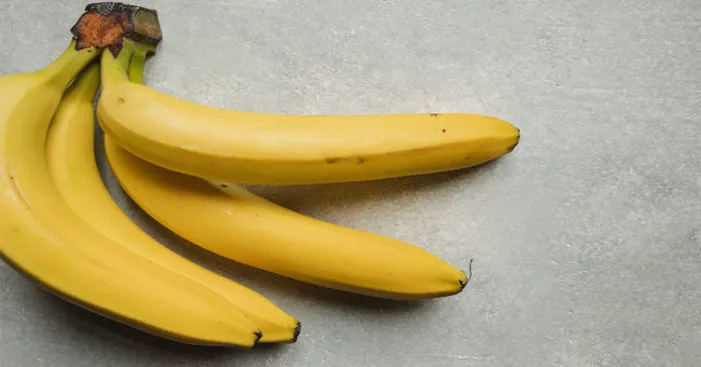
Benefits of bananas on hair:
Bananas provide good nutrition to your hair and help moisturize your scalp.
This helps control dandruff.
Bananas contain a lot of nutritious substances including Potassium, Vitamins, natural oils, and carbohydrates which help, when used in hair masks, soften the hair and protect its natural elasticity.
Banana hair-growth mask:
There are many recipes for hair masks, and most of them are pretty easy to make.
Slice 2 ripe bananas and mix them with half-cup of coconut oil, blend the mixture until it becomes smooth, then you can add a teaspoon of honey.
Apply this mixture to your hair, make sure it’s wet, and that you get the roots as well.
Leave it for half an hour to an hour, then wash it off with shampoo.
Getting that many nutrients from bananas and honey, your hair will have all the Potassium and Vitamins to encourage its growth!
How do bananas help your body?
Ever wondered what could be the link between most celebrities including Obama, Brad Pitt, Jennifer Lawrence, and Rafael Nadal …?! Yep, they are all superfans of bananas!
With all the activities that they are doing, they need to fuel themselves with the correct fruit, which is bananas.
Eating two bananas a day will boost your energy in no time, and that would surely boost your mood as well.
Bananas have three natural sugars which are sucrose, fructose, and glucose.
These three sugars and the fiber substances of bananas will benefit your whole system every time you snack one.
Almost all athletes know about these banana super-healthy facts, which is why they include bananas in their daily training diet.
It can provide the necessary elements for old people to keep their bodies balanced, and it makes a well-balanced snack for kids during school to give them energy!
Do bananas cause constipation?
As they contain Enzymes such as fructooligosaccharide, which are proven to help natural digestion, by hindering fermentation throughout the intestines. (7)
That turns out to be a good defense against constipation.
Bananas contain ingredients called Pectin, which make a good fiber source.
In several cases, this helps transfer bowels all the way through the intestines.
As a result, bananas are very useful to deal with constipation problems.
You should also know that eating a raw green banana can cause constipation (and nobody wants that!)
do bananas help with diarrhea?
Rich in potassium, ripe bananas help to deal with diarrhea as it provides the required body electrolytes. (8)
When dealing with diarrhea, it’s recommended to eat ripe bananas as they contain higher Pectin levels, the fiber source that your body needs to handle Diarrhea.
Do bananas help you sleep?
Yes! Bananas help you sleep. Have you ever wondered about the basic substances that pharmaceuticals use to produce sleeping pills?!
Bingo, one of their many processes, is to extract Melatonin from Bananas. (9)
This hormone makes one of the best sleep stimulation substances, which is why it is used in more than 90% of sleeping aid medicines.
Furthermore, bananas also contain magnesium, an element that has a relaxation effect on the muscles.
That is exactly why many people nickname Bananas as the “sleeping pill in a peel.”
Do bananas help with heartburn?
Yes, they do!
Generally, it doesn’t matter what we eat, the way we eat it is what causes heartburn!
However, Bananas are very effective at helping with heartburn, because of the natural fiber components that help clean the colon.
Moreover, this fruit has a PH level of 5.6 which makes them great for people who suffer from acid reflux.
Basically, eating one banana a day could prevent heartburn, as they make a fantastic natural laxative solution.
Do bananas lower blood pressure?
According to the WHO, 1 in 5 people worldwide suffers from hypertension. (10)
Pretty scary numbers right? In fact, most of the people who deal with hypertension are not even aware of it, which explains why only 1 in 5 people have it under control.
Guess what? Bananas can indeed lower your blood pressure!
Here’s how:
They provide a high level of potassium and a low sodium level, average bananas contain up to 500 milligrams of potassium and just 1 milligram of sodium.
Potassium is known for its lowering blood pressure effect.
Sodium causes the exact opposite and strengthens blood pressure, which gives bananas the ability to lower blood pressure.
That by definition makes it a great asset to your blood pressure defense system.
After several types of research, Health specialists have confirmed the ability of bananas to lower blood pressure and can even help prevent stroke symptoms. (11)
Bananas help with cramps:
One of the many vitamins bananas have is B6.
This vitamin is very helpful when it comes to easing your painful cramps.
Try adding one banana to your daily intake for a month, make them two during your period, and see the difference for yourself!
This is because, daily banana intakes keep your body’s pyridoxine level high, and that eases the pain of cramps.
As mentioned above, Bananas contain a lot of potassium, which oppose the salt levels in the blood and help neutralize it.
Therefore eliminate one of the major causes of painful cramps.
In some cases, periods come with diarrhea, and bananas could also fight that.
Are bananas good for diabetics?
They are! Bananas can help you better control your blood sugar levels.
Regardless of the amount of sugar they contain, the trick is to eat mid-ripen bananas, as their Glycemic index GI value is 30, compared to the 60 GI value that comes in all-ripen bananas.
The recommended serving size is the small ones, which includes bananas shorter than 5 inches.
Fibers are essential in regulating blood sugar levels.
Considering the Pectin fiber source that bananas have, they can be a great help for people with type 2 diabetes, as they aid in keeping their blood sugar levels under control and even prevent spikes.
(Check also the benefits of green apples for diabetics! )
Banana peel for eczema:
This is a debatable topic, bananas may flare up eczema.
Though there is something about banana peels that makes them, one of the best natural remedies for eczema treatment!
When dealing with eczema, you can use a banana peel by rubbing the inside of the peel on the flared-up area, then keep the peel on the affected area for up to 20 minutes.
This would make you feel better and heal your eczema.
PS: Make sure you don’t base your daily intake on just huge amounts of bananas since they are a high-carb food. As recommended, one or two bananas a day would make you: relaxed, healthier, and boost your energy!
Precautions you need to know before you eat bananas:

Like most of the food we eat, it is generally healthy to eat bananas in moderate doses of 1 to 2 bananas a day.
May interfere with blood pressure drugs:
For those who take potassium-based drugs to regulate their blood pressure, bananas may interfere with those types of medicines. (12)
This is because just one average banana provides about 10% of our daily need for potassium.
That is considerably large especially if you are taking blood regulation medicines as your body will have an excess of potassium.
Allergy:
Even though this is not very common, but some people experience allergic symptoms when they eat bananas.
Those symptoms are usually mild ranging from tongue swelling to difficulties in breathing and in rare cases it can be life-threatening.
Usually, people who have allergies to certain types of protein are more likely allergic to bananas as well. (13)
In addition, those who have an allergy to latex products are probably also allergic to plant foods including bananas.
Tooth decay:
Bananas are very high in sugar which may lead to tooth decay.
Thus, it is very important to maintain dental hygiene if you are a regular consumer of bananas. (14)
May increase weight:
Even though eating a moderate amount of 1 to 2 bananas a day is good to lose weight.
Consuming more than that recommended dose may risk an increase in the calorie intakes and result in gaining weight.
Using bananas (Cavendish):
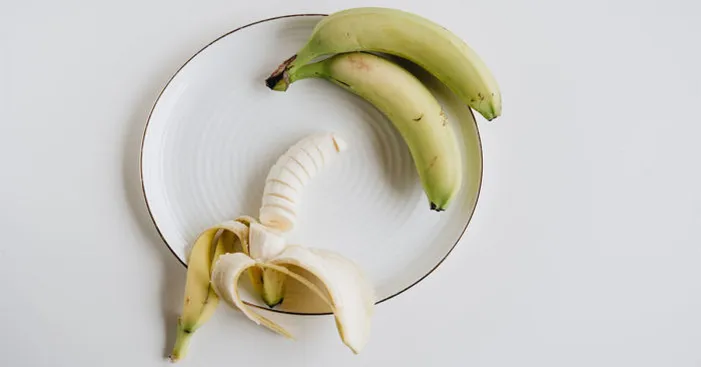
- Fresh breakfast with an acai bowl made of chopped acai, bananas, and strawberries. (15)
- Banana mouse to replace the usual chocolate mousse by blending bananas with fresh cream and honey to obtain a thick delicious mousse free of eggs.
- Banana pie.
- Banana bread.
- Chocolate and banana egg rolls.
- Fried bananas with maple and vanilla.
If you bought a lot of bananas and some of them are becoming overripe, you can use them in these waste-free recipes:
- Banana fritters.
- Homemade cereal.
- Banana and chia pudding.
- Fruit juice.
- Chocolate banana cake.
Buying bananas:
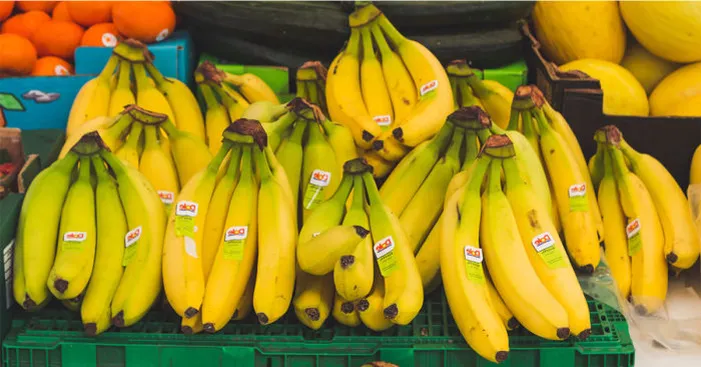
Bananas are one of the easiest fruits to choose and the trick is to focus on the color of the Cavendish banana (most common).
Cavendish bananas have 7 different levels of maturity and 4th one is what we should look for.
During the 4th stage, this classical banana tends to have bright yellow skin with minimum spots on it.
The texture of a 4th stage mature banana is usually soft and it is much recommended to consume raw for better digestion.
Moreover, going through the 5th,6th, and 7th stages of maturity, Cavendish bananas tend to get darker in color and sweeter in taste.
If you are planning to make some delicious dessert using bananas, it is better if you choose very ripe ones with brown color.
This is because a very ripe banana is much sweeter and can even replace regular sugar in a recipe.
Storing bananas:
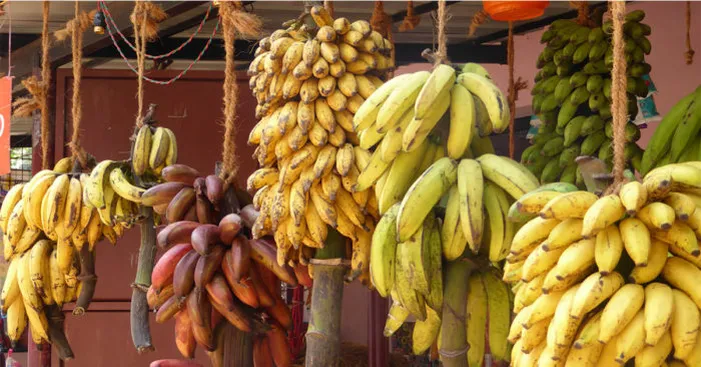
The only downside to bananas is that they have a very short life expectancy.
After getting fresh Bananas, you usually have no choice but to consume them in 2 or 3 days.
It is hard to keep bananas fresh. Unfortunately, putting bananas in the refrigerator will only increase the browning reaction, since the cold temperature causes cells to break down.
However, you should know that the greener the banana, the longer you can store it.
You shouldn’t be worried about purchasing green bananas as the ripening process continues even after you get it home.
This could be very useful as you can start consuming green bananas to enjoy their benefits, and still have ones that ripen over time.
To extend their freshness period, it is recommended to purchase greener bananas, let them ripen, then place them in the refrigerator!
Their skin could turn brown but the inside fruit remains white and soft.
This could double the banana’s life expectancy for up to 4 or 5 days.
For optimal ripening, it is best to hang the bananas on a hook.
However, if you want to speed up the ripening process, you can put them in a paper bag.
On the other hand, if you want to freeze bananas you need to turn them into a puree with some lemon juice to ensure their preservation.
The banana and lemon juice puree can remain un-rotten for up to 3 months.
Later on, you can use that puree in your dessert recipes.
references:
(1): Eat spotty bananas to fight cancer | The News Tribe
(2): Banana (mcgill.ca)
(3): Banana (internationalbananamuseum.com)
(4): Bananas the Best-Selling Item at Walmart (businessinsider.com)
(5): Uganda is the Banana Republic of Africa and Produces most Bananas | Kabiza Wilderness Safaris
(6): What are little boys made of? Scientists pinpoint bananas | Medical research | The Guardian
(7): 5 Foods to Help Your Digestive System | UPMC HealthBeat
(8): Should you eat a banana when suffering from diarrhea? | The Times of India (indiatimes.com)
(9): How A Banana Before Bed Can Help You Sleep Better – Amerisleep
(10): More than 700 million people with untreated hypertension (who.int)
(11): 15 foods that help lower blood pressure (medicalnewstoday.com)
(12): Foods and medications that don’t mix – health and body | CHOICE
(13): Heterogeneity of banana allergy: characterization of allergens in banana-allergic patients – PubMed (nih.gov)
(14): Bananas: Good or Bad? (healthline.com)
(15): acai | Description, Fruit, & Nutrition | Britannica
